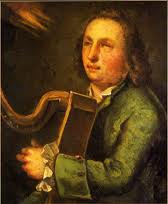Annotation:Lament for Terence MacDonough: Difference between revisions
No edit summary |
m (Text replacement - "garamond, serif" to "sans-serif") |
||
| (2 intermediate revisions by one other user not shown) | |||
| Line 1: | Line 1: | ||
=='''Back to [[{{BASEPAGENAME}}]]'''== | =='''Back to [[{{BASEPAGENAME}}]]'''== | ||
---- | ---- | ||
<p><font face=" | <p><font face="sans-serif" size="4"> | ||
'''LAMENT FOR TERENCE MACDONOUGH'''. AKA and see "[[McDonogh’s Lamentation]]," "[[Young | '''LAMENT FOR TERENCE MACDONOUGH'''. AKA and see "[[McDonogh’s Lamentation]]," "[[Young Terrance McDonough]]." Irish, Lament (3/4 time). G Minor. Standard tuning (fiddle). AB. Composed by blind Irish harper [[Biography:Turlough O'Carolan]] (1670-1738) on the occasion of the death of Terence MacDonough of Sligo in 1713. Donal O'Sullivan (1958) notes structural similarities with "[[Carolan's Cottage]]." O'Sullivan has an extensive background note on this tune, covering more than two whole pages. | ||
[[File:carolan.jpg|200px|thumb|left|Turlough O'Carolan]] | [[File:carolan.jpg|200px|thumb|left|Turlough O'Carolan]] | ||
Terence MacDonough (?-1713) of Sligo was an interesting man, indeed--a soldier, lawyer, man of affairs, patron, and poet himself. An able Counsellor-at-law, the MacDonough represented the borough of Sligo in King James's Irish Parliament of 1689. He was the only Catholic Counsel admitted to the Irish bar in his day. He fought for King James at the end of the 17th century, attaining the rank of Captain in Colonel Henry Dillon's regiment of infantry. He was captured at the siege of Derry in 1689, but after the end of hostilities in 1691 MacDonaough resumed his practice at the bar, and attained great renown. He was much mourned at his death, not the least by numerous Irish poets and bards from whom several poems expressive of the grief survive, for not only was he a fellow-poet, but as a patron his house was "a seminary to the Bards of Ireland." "Lament for Terence MacDonough" first appears in John and William Neal's '''Collection of the Most Celebrated Irish Tunes''' (Dublin, c. 1724, p. 10). See also James Oswald's version as "[[McDonogh’s Lamentation]]." | Terence MacDonough (?-1713) of Sligo was an interesting man, indeed--a soldier, lawyer, man of affairs, patron, and poet himself. An able Counsellor-at-law, the MacDonough represented the borough of Sligo in King James's Irish Parliament of 1689. He was the only Catholic Counsel admitted to the Irish bar in his day. He fought for King James at the end of the 17th century, attaining the rank of Captain in Colonel Henry Dillon's regiment of infantry. He was captured at the siege of Derry in 1689, but after the end of hostilities in 1691 MacDonaough resumed his practice at the bar, and attained great renown. He was much mourned at his death, not the least by numerous Irish poets and bards from whom several poems expressive of the grief survive, for not only was he a fellow-poet, but as a patron his house was "a seminary to the Bards of Ireland." "Lament for Terence MacDonough" first appears in John and William Neal's '''Collection of the Most Celebrated Irish Tunes''' (Dublin, c. 1724, p. 10). See also James Oswald's version as "[[McDonogh’s Lamentation]]," and mention of the tune in note to "[[Annotation:Owen O'Rourke]]." | ||
<br> | <br> | ||
<br> | <br> | ||
</font></p> | </font></p> | ||
<p><font face=" | <p><font face="sans-serif" size="4"> | ||
''Source for notated version'': | ''Source for notated version'': | ||
<br> | <br> | ||
<br> | <br> | ||
</font></p> | </font></p> | ||
<p><font face=" | <p><font face="sans-serif" size="4"> | ||
''Printed sources'': '''Complete Collection of Carolan's Irish Tunes''', 1984; No. 210, p. 144. O'Sullivan ('''Carolan: The Life, Times and Music of an Irish Harper'''), 1958, No. 210, p. 222. | ''Printed sources'': '''Complete Collection of Carolan's Irish Tunes''', 1984; No. 210, p. 144. O'Sullivan ('''Carolan: The Life, Times and Music of an Irish Harper'''), 1958, No. 210, p. 222. | ||
<br> | <br> | ||
<br> | <br> | ||
</font></p> | </font></p> | ||
<p><font face=" | <p><font face="sans-serif" size="4"> | ||
''Recorded sources'': <font color=teal></font> | ''Recorded sources'': <font color=teal></font> | ||
</font></p> | </font></p> | ||
Latest revision as of 14:11, 6 May 2019
Back to Lament for Terence MacDonough
LAMENT FOR TERENCE MACDONOUGH. AKA and see "McDonogh’s Lamentation," "Young Terrance McDonough." Irish, Lament (3/4 time). G Minor. Standard tuning (fiddle). AB. Composed by blind Irish harper Biography:Turlough O'Carolan (1670-1738) on the occasion of the death of Terence MacDonough of Sligo in 1713. Donal O'Sullivan (1958) notes structural similarities with "Carolan's Cottage." O'Sullivan has an extensive background note on this tune, covering more than two whole pages.

Terence MacDonough (?-1713) of Sligo was an interesting man, indeed--a soldier, lawyer, man of affairs, patron, and poet himself. An able Counsellor-at-law, the MacDonough represented the borough of Sligo in King James's Irish Parliament of 1689. He was the only Catholic Counsel admitted to the Irish bar in his day. He fought for King James at the end of the 17th century, attaining the rank of Captain in Colonel Henry Dillon's regiment of infantry. He was captured at the siege of Derry in 1689, but after the end of hostilities in 1691 MacDonaough resumed his practice at the bar, and attained great renown. He was much mourned at his death, not the least by numerous Irish poets and bards from whom several poems expressive of the grief survive, for not only was he a fellow-poet, but as a patron his house was "a seminary to the Bards of Ireland." "Lament for Terence MacDonough" first appears in John and William Neal's Collection of the Most Celebrated Irish Tunes (Dublin, c. 1724, p. 10). See also James Oswald's version as "McDonogh’s Lamentation," and mention of the tune in note to "Annotation:Owen O'Rourke."
Source for notated version:
Printed sources: Complete Collection of Carolan's Irish Tunes, 1984; No. 210, p. 144. O'Sullivan (Carolan: The Life, Times and Music of an Irish Harper), 1958, No. 210, p. 222.
Recorded sources:
